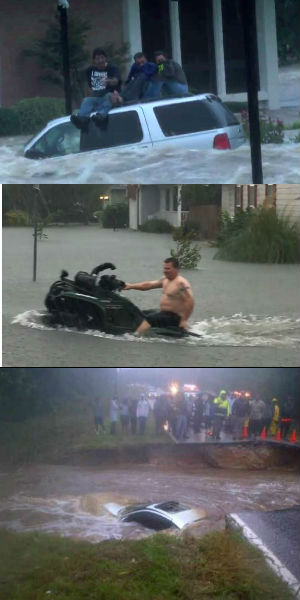RALEIGH, N.C. — At least eight people were killed and four are missing in North Carolina as Hurricane Matthew dumped more than a foot of rain in some parts and left roads and neighborhoods flooded.

On Saturday, Matthew sideswiped two of the South’s oldest and most historic cities — Savannah, Georgia, and Charleston, South Carolina — and also brought torrential rain and stiff wind to places like Myrtle Beach, South Carolina.
After pounding North Carolina and drenching parts of Virginia, it was expected to veer out to sea, lose steam and loop back around toward the Bahamas and Florida, too feeble to cause any trouble.
For nearly its entire run up the coast from Florida, Matthew hung just far enough offshore that communities did not feel the full force of its winds.
Its storm center, or eye, finally blew ashore just north of Charleston on Saturday, but only briefly. And by that time, Matthew was just barely a hurricane, with winds of just 75 mph.
In Brunswick County, about 100 hotel guests had to be bused to a shelter because the main walls of the Comfort Inn Suites were on the verge of collapse, and dramatic video showed Fayetteville police rescuing a woman and her small child from their car as rising waters swallowed it.
Terrell Williams said that when he went out earlier Saturday to get supplies in Fayetteville, he had to take several detours because police had blocked flooded roads in the area.
“It was raining really bad,” he said. “There were some areas where you could see the water starting to overtake the bridges.”
Fayetteville’s Public Works Commission declared a water emergency and issued a boil water advisory on Sunday due to flooding throughout the city.
Cumberland County officials said at a news conference Sunday morning that crews there had performed 227 water rescues and rescued 574 people. More than 500 people are being housed in shelters in the county. They urged residents to stay home and not venture out into the streets.
Overall, there have been nearly 900 water rescues so far in North Carolina.
The U.S. Coast Guard has rescued 10 people in North Carolina, including eight from rooftops in Pinetops in Edgecombe County, as state reels from the damage caused by Hurricane Matthew.
The Coast Guard said in a news release that an MH-60 Jayhawk helicopter crew from Air Station Elizabeth City on Sunday morning and took the eight people to Pitt-Greenville Airport.
An estimated 2 million people in the Southeast were ordered to evacuate their homes as Matthew closed in. By hugging the coast, the storm pretty much behaved as forecasters predicted. A shift of just 20 or 30 miles could have meant widespread devastation.
“People got incredibly lucky,” Colorado State University meteorology professor Phil Klotzbach. “It was a super close call.”
While Matthew’s wind speed had dropped considerably by the time it hit the Southeast coast, the storm will still go down as one of the most potent hurricanes on record, based on such factors as wind energy and longevity, and one of the most long-lived major hurricanes, too. The storm had winds of at least 110 mph for more than seven days.
Even with winds only half that speed, trees and power lines came down like dominoes across the state.
Power outages across the state stood at more than 806,000 as of 11 a.m. Sunday. North Carolina Emergency Management reported Duke Energy with 501,356 outages; Dominion with 56,483 outages; Co-Ops with 246,639; and ElectriCities power company with 11,710 outages. The total number of outages across the state stands at 806,828.
The treacherous conditions are slowing down the restoration process in some of the harder hit areas, Duke Energy spokeswoman Meredith Archie said. Duke currently has 5,600 crew members focused on the restoring power and they’ve requested an additional 3,000 line and tree crews to help.
“With the damage caused by this storm, the restoration process is going to take longer than normal…but please know that Duke Energy is out there assessing damage, and in areas they can, they’ll be restoring power as soon as possible and we won’t stop until everybody has their lights back on,” Archie said.
Three-quarters of a million people in South Carolina were left without electricity, and 250,000 were in the dark in coastal Georgia. About 1 million people in Florida lost power.
Although the storm is moving off the northeastern coast of North Carolina, the flooding and destruction left behind will remain for awhile, McCrory said.
“This is going to be a prolonged event. We will have very serious issues.”
Transportation officials are making quick progress in reopening parts of Interstate 40 after flooding brought on by the torrential rain.
The North Carolina Department of Transportation reported on its website Sunday that there are now only two shutdowns on I-40. A three-mile stretch of the highway is still blocked east of Raleigh in Wake County. There’s also a three-mile shutdown of I-40 east of Benson in Johnston County.
Interstate 95 northbound and southbound in Dunn was shut down Sunday afternoon for an unknown amount of time due to a breach at Rhodes Pond, Harnett County officials said.



